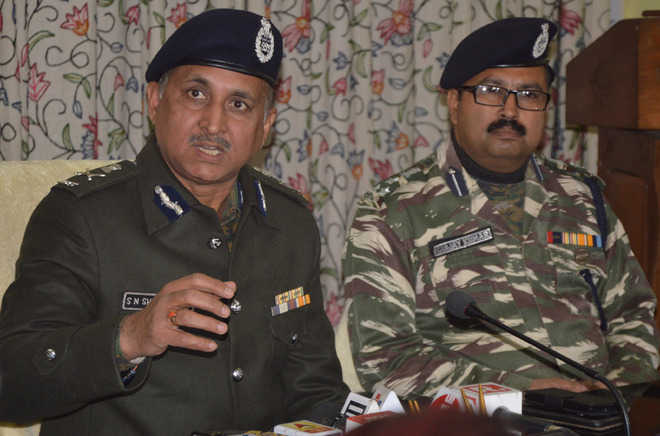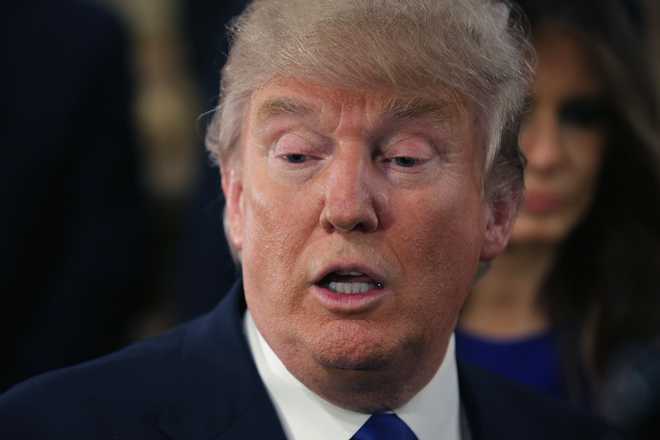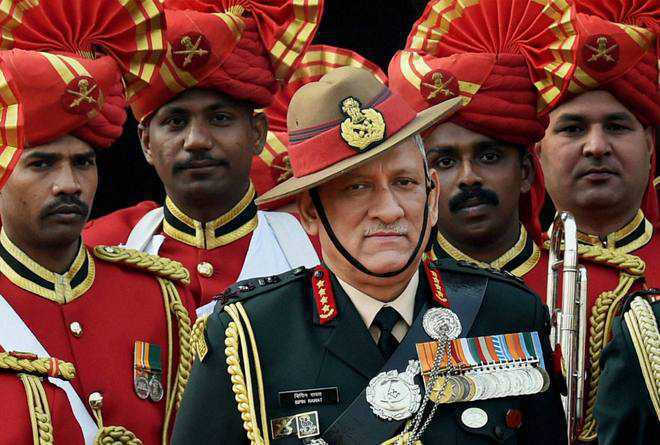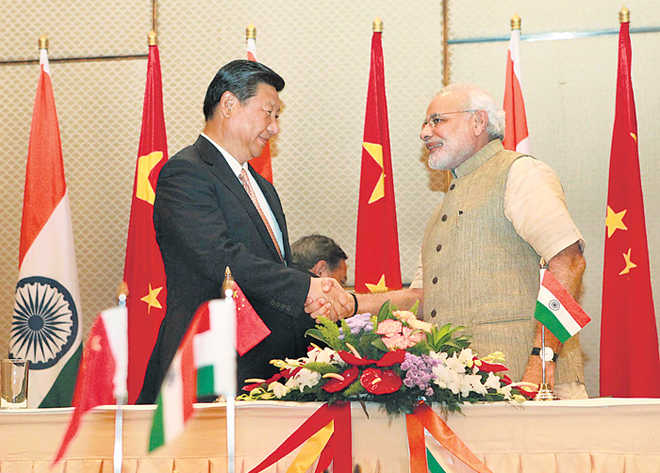 Chinese President Xi Jinping”s visit to India exposed India”s present-day predicament.
Chinese President Xi Jinping”s visit to India exposed India”s present-day predicament.THE Indian media discourse on foreign policy, customary to New Year, once again couldn’t see the wood for the trees. To be sure, in January, foreign policy discourse will narrow down to two glamorous events — Israeli Prime Minister Benjamin Netanyahu’s visit and the motorcade of ASEAN leaders to witness the spectacular Republic Day parade on Rajpath. But in the brouhaha of event management, the ‘big picture’ gets lost. The year 2018 has begun trotting toward the canter in what promises to be an extraordinary period in regional politics. The ‘big picture’ becomes important because compared to the bipolar Cold War era when the struggle was ideological and power flowed through the barrel of the gun, the alchemy of Sino-American rivalry is different. It harks back to the 17th century — or, more appropriately, to the later 18th century when the struggle in the Age of Discovery morphed into the colonial rivalry between Great Britain and France seeking dominance over the subcontinent through proxy native rulers and also by direct intervention. Tipu Sultan’s defeat in 1799 marginalised the French influence and led to the rapid expansion of British power. The war in Afghanistan has become an analogous event. Trading rivalries have been at the root of the ebb and flow of modern history. However, Indian diplomacy revels in viewing Afghanistan through the geopolitical prism and pays scant attention to the economic dimension, although good politics is invariably about the creation of wealth. Arguably, what provokes the Trump administration most regarding Pakistan could be its acquiescence to the Chinese agenda to extend the China-Pakistan Economic Corridor to Afghanistan and Central Asia, and connect it with the China-Central Asia-West Asia Economic Corridor. China’s far-reaching move to bring Pakistan and Afghanistan under its BRI canopy makes complete nonsense of the raison d’etre of the establishment of permanent American bases in the region. China will be the real ‘winner’ now, whether the US wins the Afghan war or not. The mother of all ironies is that Beijing simply borrowed and finessed the underpinning of the American strategy labelled as ‘New Silk Road’ (outlined first in July 2011 in a speech at Chennai by US secretary of state Hillary Clinton), which intended to link up Central Asia with South Asia, but in reality aimed at creating transportation routes to evacuate the vast mineral resources of Inner Asia to the world market. It was only one year earlier, in June 2010, that the New York Times first reported the existence of “an internal Pentagon memo” based on the secret findings of a small team of Pentagon officials and American geologists regarding “nearly $1 trillion in untapped mineral deposits in Afghanistan, far beyond any previously known reserves… The previously unknown deposits — including huge veins of iron, copper, cobalt, gold and critical industrial metals like lithium —are so big and include so many minerals that are essential to modern industry that Afghanistan could eventually be transformed into one of the most important mining centres in the world.” Clearly, India is missing the plot time and again — be it in Sri Lanka, Nepal and Bangladesh or Afghanistan — because its obsessively security-centric regional strategy based on geopolitics, with an eye on China, is out of sync with what the Germans would call ‘zeitgeist’ (spirit of the times.) China is playing a much bigger game. The tools are quintessentially the same as of the Great Britain in the 19th century (transfer of wealth from colonies to ‘mother ship’) or the US’ (Marshall Plan, Breton Woods, etc) — namely, economic tools. China’s style varies, inevitably, because this is a globalised world. Basically, China is unlikely to use military power to establish hegemony and will rely on economic tools. The spirits of Jallianwala Bagh or the ghost of Salvador Allende will not haunt China’s banquet table. The BRI may not be philanthropy but is not usury by a stretch, either. There is, admittedly, a ‘win-win’ content to it. We may expect China to chip away at dollar’s artificially propped up status as world currency, and when that gains traction, America’s decline will accelerate dramatically. The BRI, by creating a new supply chain, provides a platform. On January 2, interestingly, Pakistan’s Central Bank announced that Chinese Yuan will be an approved foreign currency for trade and investments. Suffice to say, the ‘militarisation’ of our foreign policy is not going to take us far. We are getting all dressed up with nowhere to go. During former PM Manmohan Singh’s leadership, we began relying on economic diplomacy as the key template of foreign policy. The respect Manmohan Singh commanded from Barack Obama and Wen Jiabao alike was due to the forward-looking vision he displayed. (The RIC, BRICS, membership of SCO, AIIB, G20, etc. belong to that era.) Alas, the Indian foreign policy has since been regressive. Prime Minister Modi has the ingenuity to figure a way out of the present impasse without quite appearing to follow his predecessor’s path-breaking footfalls. The all-too-apparent dichotomy during Chinese President Xi Jinping’s visit to Ahmedabad and New Delhi exposed India’s present-day predicament. The US is doomed to lose the struggle in our region because it has nothing in its repertoire to match the BRI. The US is caught in a time warp. The elites refuse to see that American exceptionalism is over and imperialism has overreached. Thus, the impetus to retool is simply not there. India too lacks the capacity to create a counter-narrative to the BRI, which also has a staggering global dimension to it. Our intellectual challenge lies in making use of the BRI to India’s best advantage. If China could persuade a reluctant Pakistan to let the CPEC run through the Khyber across the disputed Durand Line into the seamless Central Asian steppes, it should be possible for Beijing to propose a small loop in an easterly direction somewhere to bring it into our Punjab. The optimal way to address problematic relationships is always by making the adversary a stakeholder. The writer is a former ambassador












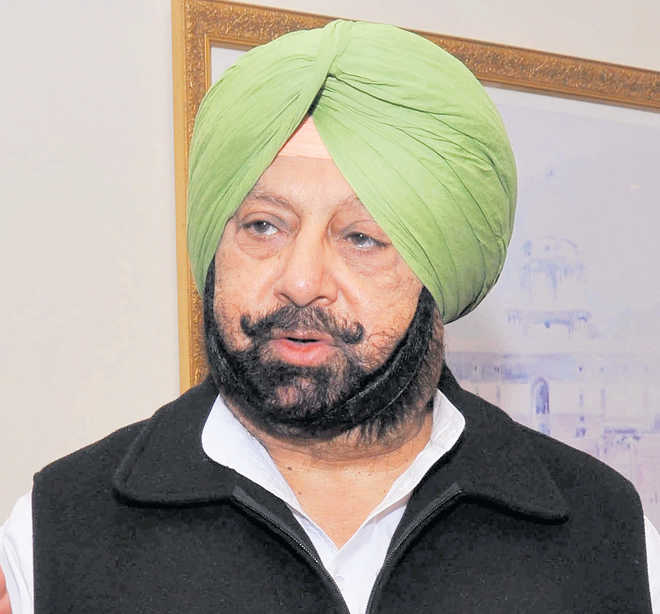
 HT FILE
HT FILE
